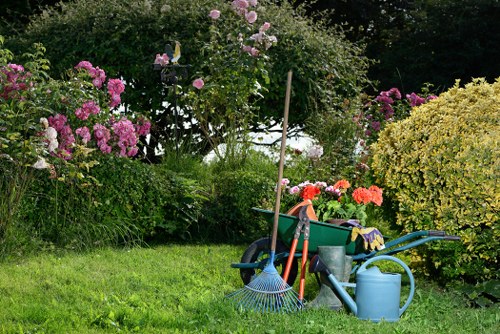Comprehensive Guide to Garden Maintenance in Hammersmith
Introduction to Garden Maintenance in Hammersmith

Maintaining a beautiful garden in Hammersmith requires a blend of expertise, dedication, and knowledge of the local climate. Whether you’re a seasoned gardener or just starting out, understanding the unique aspects of garden care in this vibrant London area is essential for creating and sustaining a thriving outdoor space.
Hammersmith's temperate climate provides favorable conditions for a wide variety of plants. However, local factors such as soil quality, seasonal changes, and urban settings can influence gardening practices. By tailoring your maintenance approach to these specific conditions, you can ensure your garden remains lush and vibrant throughout the year.
In this article, we will explore the key aspects of garden maintenance in Hammersmith, including seasonal tasks, plant selection, soil management, pest control, and the benefits of professional gardening services. Whether you’re looking to enhance your home’s curb appeal or create a serene backyard retreat, this guide will provide valuable insights to help you achieve your gardening goals.
Seasonal Garden Maintenance

Successful garden maintenance involves understanding and adapting to the changing seasons. Each season presents unique challenges and opportunities for garden care in Hammersmith.
Spring
Spring is an ideal time to prepare your garden for the growing season. Start by clearing away any debris from winter and pruning dead or damaged branches. Planting new flowers and vegetables can breathe new life into your garden, while regular watering and fertilizing help establish strong roots before the heat of summer arrives.
Summer
During summer, maintaining soil moisture is crucial. Implementing an efficient watering system, such as drip irrigation, can help conserve water while keeping plants healthy. Regular weeding and mulching also play a vital role in preventing moisture loss and suppressing unwanted growth.
Autumn
Autumn is the time to prepare your garden for the colder months. Planting bulbs for spring, protecting delicate plants with mulch, and cleaning up fallen leaves can help your garden withstand the winter chill. It's also an excellent time to divide perennials and refresh your garden beds.
Winter
In winter, focus on protecting your garden from frost and freezing temperatures. Use frost covers, insulating materials, and proper pruning techniques to minimize damage. Even in the colder months, maintaining a tidy garden can set the stage for a vibrant spring.
Plant Selection for Hammersmith Gardens

Choosing the right plants is fundamental to successful garden maintenance. Hammersmith's climate supports a diverse range of flora, but selecting species that thrive locally can reduce maintenance efforts and enhance the garden's beauty.
Perennials
Perennials are a popular choice for Hammersmith gardeners due to their ability to return year after year with minimal care. Options like lavender, hostas, and peonies provide long-lasting color and structure to garden beds.
Annuals
Annuals offer vibrant, seasonal color and can be used to complement perennials. Plants such as marigolds, petunias, and zinnias are excellent for adding bursts of brightness to your garden throughout the growing season.
Vegetables and Herbs
Growing your own vegetables and herbs is both rewarding and practical. Consider planting tomatoes, cucumbers, basil, and rosemary in your Hammersmith garden. These plants not only enhance your outdoor space but also provide fresh produce for your kitchen.
Native Plants
Incorporating native plants can promote biodiversity and support local wildlife. Species like hawthorn, elderberry, and various grasses are well-suited to Hammersmith's environment and require less maintenance once established.
Soil Management and Fertilization

Healthy soil is the foundation of a flourishing garden. Proper soil management and fertilization techniques ensure that your plants receive the nutrients they need to grow strong and resilient.
Soil Testing
Conducting regular soil tests helps determine pH levels and nutrient content. Understanding your soil composition allows you to make informed decisions about amendments and fertilizers, optimizing plant health.
Organic Matter
Incorporating organic matter, such as compost or well-rotted manure, improves soil structure, enhances moisture retention, and promotes beneficial microbial activity. Regularly adding organic material supports sustainable garden practices.
Mulching
Mulching serves multiple purposes, including retaining soil moisture, suppressing weeds, and regulating soil temperature. Organic mulches like bark, straw, or leaf mold enrich the soil as they decompose.
Fertilization
Using balanced fertilizers ensures that your plants receive essential nutrients. Consider slow-release options to provide consistent nourishment over time. Be mindful of the specific needs of different plants to avoid over-fertilization.
Pest and Disease Control

Protecting your garden from pests and diseases is crucial for maintaining plant health. Implementing proactive and environmentally friendly control methods can minimize damage and promote a thriving garden ecosystem.
Integrated Pest Management (IPM)
IPM focuses on long-term pest prevention through a combination of biological, cultural, and mechanical practices. Regular monitoring and early detection are key components of this sustainable approach.
Biological Controls
Introducing natural predators, such as ladybugs or lacewings, can help manage pest populations without the use of harmful chemicals. Encouraging biodiversity in your garden supports these beneficial insects.
Cultural Practices
Proper plant spacing, crop rotation, and sanitation are essential cultural practices that reduce the risk of pest infestations and disease outbreaks. Removing diseased plant material promptly prevents the spread of pathogens.
Organic Treatments
When necessary, opt for organic treatments like neem oil or insecticidal soaps to address pest problems. These options are less harmful to the environment and safer for pollinators compared to synthetic chemicals.
Tools and Equipment for Garden Maintenance
Essential Gardening Tools
Having the right tools is fundamental to efficient garden maintenance. Invest in high-quality equipment that suits your gardening needs in Hammersmith.
- Pruners and Shears: Essential for trimming and shaping plants.
- Spades and Shovels: Ideal for digging and transplanting.
- Garden Fork: Useful for aerating soil and removing weeds.
- Rakes: Necessary for leveling soil and gathering debris.
- Hoses and Irrigation Systems: Critical for maintaining soil moisture.
Advanced Equipment
For larger gardens or more intensive maintenance, consider investing in advanced equipment:
- Lawn Mowers: Keep your grass neatly trimmed.
- Chainsaws: Useful for larger pruning tasks and removing dead wood.
- Leaf Blowers: Efficient for clearing fallen leaves and debris.
- Wheelbarrows: Facilitate the transport of soil, plants, and tools.
Maintenance and Storage
Proper maintenance of your tools ensures longevity and performance. Clean blades after use, sharpen cutting edges regularly, and store tools in a dry, organized space to prevent rust and damage.
Benefits of Professional Garden Maintenance Services
Expert Knowledge
Professional gardeners bring a wealth of experience and knowledge to your garden. They understand the specific needs of various plants and can offer tailored solutions to enhance your garden's health and aesthetics.
Time-Saving
Maintaining a garden requires significant time and effort. Hiring professionals allows you to enjoy a beautiful garden without the stress of regular upkeep, freeing up your schedule for other activities.
Customized Care
Professional services offer customized maintenance plans based on your garden's unique requirements. From seasonal pruning to specialized treatments, experts ensure that every aspect of your garden is well-cared for.
Increased Property Value
A well-maintained garden enhances your property's curb appeal and can increase its market value. Professional maintenance ensures that your outdoor space remains attractive and inviting throughout the year.
DIY Garden Maintenance Tips
Regular Weeding
Weeding is essential to prevent unwanted plants from competing with your desired flora. Regularly removing weeds by hand or with appropriate tools keeps your garden beds tidy and healthy.
Proper Watering Techniques
Efficient watering practices, such as watering early in the morning or late in the evening, reduce evaporation and ensure that plants receive adequate moisture. Using soaker hoses or drip irrigation systems can improve water distribution.
Pruning and Trimming
Regular pruning encourages healthy growth and removes dead or diseased branches. Proper trimming techniques enhance the shape and structure of your plants, contributing to a well-maintained garden.
Composting
Creating a compost pile recycles organic waste and provides rich nutrients for your garden. Composting reduces landfill waste and improves soil quality, fostering a sustainable gardening environment.
Mulching
Applying mulch around plants helps retain soil moisture, regulate temperature, and suppress weeds. Organic mulches break down over time, enriching the soil with essential nutrients.
Pest Monitoring
Regularly inspecting your plants for signs of pests or diseases allows for early intervention. Prompt action can prevent minor issues from escalating into significant problems.
Choosing the Right Professional Garden Maintenance Service in Hammersmith
Assessing Your Needs
Before selecting a professional service, evaluate your garden's specific requirements. Consider factors such as the size of your garden, the types of plants you have, and the level of maintenance needed.
Researching Service Providers
Look for reputable garden maintenance companies in Hammersmith with positive reviews and a proven track record. Assess their range of services, expertise, and customer satisfaction levels to ensure they meet your expectations.
Requesting Quotes
Obtain detailed quotes from multiple service providers to compare pricing and services offered. Ensure that all aspects of garden maintenance, including labor, materials, and any additional costs, are clearly outlined.
Evaluating Expertise
Choose a service with experienced gardeners who are knowledgeable about local plants and gardening practices. Expertise in handling specific plant types and garden designs is essential for achieving desired outcomes.
Checking Credentials
Verify that the garden maintenance service holds necessary licenses and insurance. This ensures professionalism and protection in the event of accidents or damages during the maintenance process.
Scheduling and Flexibility
Ensure that the service provider can accommodate your scheduling needs and offers flexibility for seasonal maintenance tasks. Timely and consistent maintenance is crucial for a healthy and attractive garden.
Enhancing Your Garden with Seasonal Features
Outdoor Lighting
Installing outdoor lighting highlights your garden’s features and extends its usability into the evening hours. Solar-powered lights, lanterns, and string lights can create a warm and inviting atmosphere.
Water Features
Incorporating water features such as fountains, ponds, or birdbaths adds a soothing element to your garden. These features attract wildlife and create a peaceful ambiance.
Patio and Seating Areas
Creating comfortable seating areas allows you to enjoy your garden comfortably. Consider adding benches, outdoor sofas, or dining sets to enhance your garden’s functionality.
Garden Paths
Designing garden paths improves accessibility and adds visual interest. Materials like gravel, stone, or wood can complement your garden’s aesthetic while providing practical pathways.
Seasonal Planting
Planting seasonal flowers and plants ensures continuous color and variety throughout the year. Choose species that bloom in different seasons to maintain an attractive garden all year round.
Garden Art and Decorations
Incorporating garden art, sculptures, or decorative elements adds personality and character to your outdoor space. Choose pieces that reflect your style and complement the overall garden design.
Sustainable Gardening Practices
Water Conservation
Implementing water-saving techniques helps reduce your garden's environmental impact. Collecting rainwater, using drought-resistant plants, and optimizing irrigation systems are effective strategies for conserving water.
Organic Gardening
Adopting organic gardening practices minimizes the use of synthetic chemicals and promotes a healthier ecosystem. Use natural fertilizers, pest control methods, and sustainable soil management to maintain a green garden.
Composting and Recycling
Recycling organic waste through composting enriches your soil and reduces landfill waste. Incorporate kitchen scraps, garden clippings, and other biodegradable materials into your compost pile for nutrient-rich soil amendment.
Supporting Biodiversity
Encouraging biodiversity fosters a resilient garden ecosystem. Planting a variety of species, creating habitats for pollinators, and providing shelter for beneficial insects contribute to a balanced and thriving garden environment.
Energy-Efficient Practices
Using energy-efficient tools and renewable energy sources, such as solar-powered lights, reduces your garden's carbon footprint. Opt for manual tools when possible to minimize energy consumption.
Native and Adapted Plants
Choosing native and adapted plants ensures that your garden thrives with minimal intervention. These plants are well-suited to the local climate and soil conditions, requiring less water and maintenance.
Common Challenges in Garden Maintenance
Pest Infestations
Pests can quickly damage plants and disrupt the balance of your garden. Identifying and managing pests early prevents extensive damage and maintains plant health.
Disease Outbreaks
Diseases caused by fungi, bacteria, or viruses can spread rapidly if not addressed promptly. Implementing preventive measures and using appropriate treatments are essential for controlling plant diseases.
Weed Overgrowth
Weeds compete with your plants for nutrients, water, and sunlight. Regular weeding and the use of mulches help keep weeds at bay and promote the growth of desirable plants.
Soil Degradation
Poor soil quality can hinder plant growth and reduce garden productivity. Regular soil testing, amending with organic matter, and sustainable soil management practices help maintain healthy soil.
Weather Extremes
Extreme weather conditions, such as heavy rain, frost, or drought, can stress plants and cause damage. Implementing protective measures and selecting resilient plant species mitigates the impact of adverse weather.
Lack of Time or Expertise
Maintaining a garden requires time and knowledge. Limited availability or gardening experience can make it challenging to keep your garden in optimal condition. Professional garden maintenance services can provide the necessary support and expertise.
Maximizing Garden Aesthetics
Color Coordination
Coordinating plant colors enhances the visual appeal of your garden. Use a mix of complementary and contrasting colors to create dynamic and harmonious displays.
Plant Height and Structure
Varying plant heights and structures adds depth and dimension to your garden. Mix tall, medium, and low-growing plants to create layers and visual interest.
Texture and Form
Incorporating plants with different textures and forms enriches the sensory experience of your garden. Combine smooth, rough, glossy, and matte textures to create a tactile and visually appealing environment.
Seasonal Highlights
Highlighting specific plants during their peak blooming seasons ensures that your garden remains vibrant year-round. Plan your planting schedule to showcase seasonal favorites.
Water Management Features
Integrating water management features like rain gardens or permeable pavements enhances garden sustainability while adding aesthetic value. These features help manage runoff and prevent erosion.
Lighting Design
Thoughtful lighting design accentuates garden features and creates ambiance in the evenings. Use a combination of pathway lights, spotlights, and ambient lighting to achieve the desired effect.
Final Thoughts on Garden Maintenance in Hammersmith
Maintaining a garden in Hammersmith is a rewarding endeavor that combines aesthetic beauty with environmental sustainability. By understanding the local climate, selecting appropriate plants, and implementing effective maintenance practices, you can create a thriving outdoor space that enhances your home and provides a sanctuary for relaxation and enjoyment.
Whether you choose to manage your garden independently or enlist the help of professional garden maintenance services, the key to success lies in consistent care, informed decision-making, and a genuine passion for gardening. Embrace the challenges and joys of garden maintenance, and watch your Hammersmith garden flourish with life and color.
Ready to transform your garden into a stunning oasis? Contact us today to discuss how our expert garden maintenance services can help you achieve the garden of your dreams in Hammersmith.

